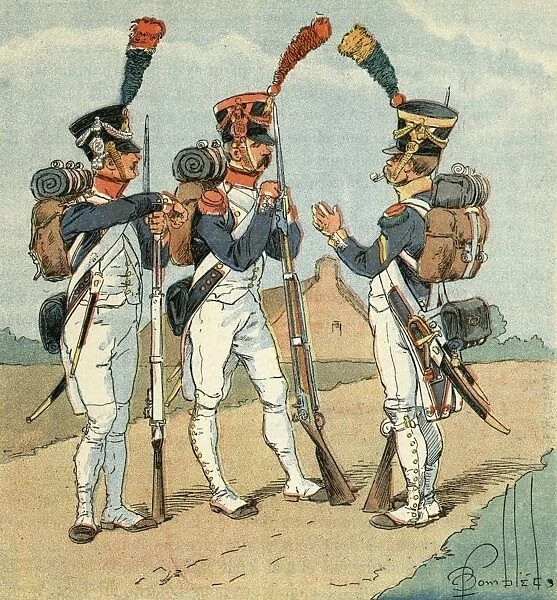There has understandably been a lot on here over the past couple of days about National Service.
So as a historian who actually studies and writes about compulsory military service, here are a few thoughts on the challenges it poses. A quick 🧵 1/
So as a historian who actually studies and writes about compulsory military service, here are a few thoughts on the challenges it poses. A quick 🧵 1/
(N.B. This thread doesn’t give my opinions or deal at all with the politics of it – everyone already has their thoughts on that. This is just a thread of challenges that have historically faced governments imposing universal service.)
Any National Service scheme is vastly expensive. Armies have to feed, clothe, equip, house, transport, pay and of course train the servicemen. Realistically they also need to provide professional services like medical support, support transitioning back to civilian life etc. 2/
Young people taken away from home & put in an alien environment also need a lot of mental health support (even if they essentially opt in - ask any university). This is not ‘wokery’. Suicide rates among conscripts have historically been high, and this needs to be prevented. 3/
Administering annual turnover of conscripts is an enormous task. You need more-or-less instant access to all info about young people so you can make quick decisions on eligibility – alongside basic info you need medical history, aptitude, records of criminality, abuse etc. 4/
The admin alone is vastly expensive and needs major investment in a nationwide network of physical spaces where recruits can be assessed, gathered, and processed. There also needs to be a very rapid but robust system for appeals against recruitment board decisions. 5/
Outsourcing elements of selection to non-military personnel (e.g. GPs passing recruits as fit) always leads to problems, with too many people incorrectly accepted/rejected for service. Doing it ‘in house’ in the military is expensive and time-consuming. 6/
Language is also a major issue. Do you only conscript those who speak the national language? Do you end up with ‘national’ service that excludes a portion of the population? Or do you provide language lessons and interpreters? 7/
No system of ‘universal service’ (military or otherwise) is ever universal. It doesn’t matter what your initial hopes are, there will always be exemptions. Some are obvious, e.g. serious disabilities. Others are less so, and lead to the impression that the system is unfair. 8/
There will have to be exemptions for carers/sole breadwinners. Maybe for young parents. Probably for temporary health/mental health problems. Possibly for cases of extreme hardship where people can’t afford to spend time volunteering instead of in paid work. 9/
Almost every system of conscription has ended up with effective exemptions for a range of opportunities that inevitably favour the wealthy. In this case that might be prestigious foreign uni places, voluntary gap yahs abroad, prestigious internships, reserved occupations etc. 10/
There will also be loud demands for exemption from universal pacifists, those who reject all state service, and those who reject the ideology of the state. Their protests will be loud, public, and deliberately aimed at embarrassing the government by creating martyrs. 11/
What do you do with people who refuse service, or who disappear halfway through? Imprisoning conscripts is usually very unpopular outside major war emergencies, and prosecuting ordinary people for helping them avoid service even more so. 12/
But you still need to ensure service appears to be universal - so you need punishments that target & deter evaders without making martyrs or stirring up more discontent. Society has to support your punishments – which it rarely will if the country is not facing a major threat 13/
Societal acceptance of service is the best way of making sure conscription is broadly adhered to. Societies tend to accept it if there is a clear need, if the cost in time/damage done to young lives is not too high, and if there is an ingrained habit of service. 14/
Presuming you can get all of your conscripts into the army, there is still the problem of what to do with them. Training only to immediately discharge creates real problems in morale and quality of engagement with the training, and real problems of motivation for instructors. 15/
If kept in service, armies always struggle with where to put short-term conscripts. Adding them to existing units is disruptive, compromising morale & quality. If in separate units, it is difficult to find useful roles for them, so service is a countdown to demobilisation. 16/
If the aim is to create a trained reserve of former conscripts, they will need annual/biennial refresher training. This is enormously expensive and difficult to administer, especially as more and more reservists are likely to apply for exemptions as they get older. 17/
Armies also need additional training units, equipment, temporary housing, transport capacity etc for hundreds of thousands of additional potential soldiers in the reserves. There is no point having a trained reserve if you can’t mobilise it quickly due to absence of resources 18/
National service can work – but it is expensive, disruptive, and carries permanent reputational risk for a government. To be useful, it needs overwhelming support of civil society, and a military that has a very clear reason for actively wanting partially conscripted forces. End/
• • •
Missing some Tweet in this thread? You can try to
force a refresh











